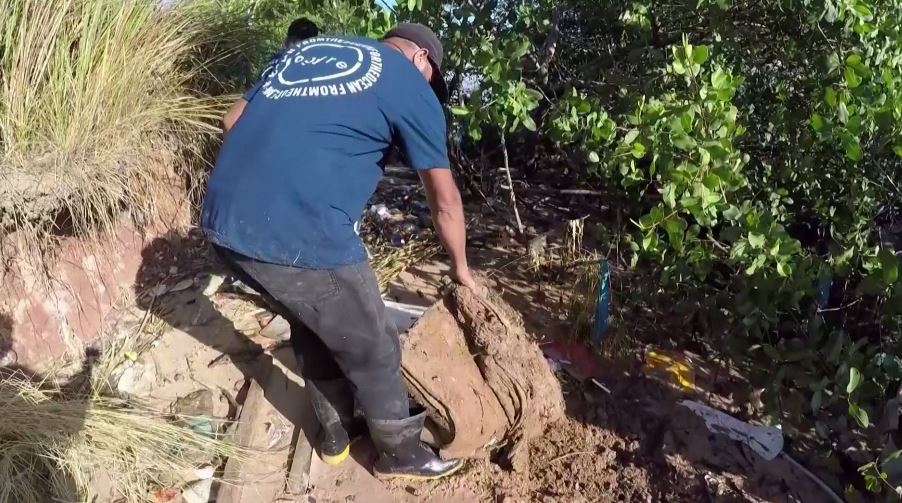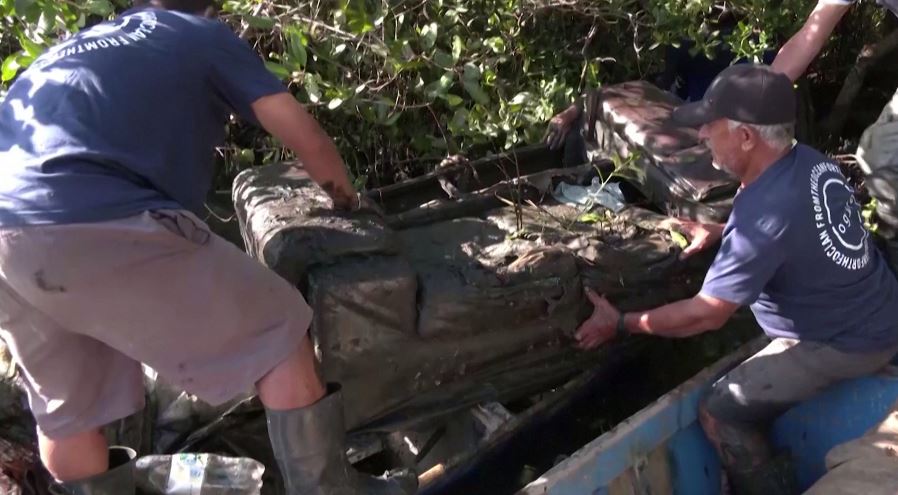INTERNATIONAL: World Oceans Day on 8 June – an international event to raise awareness over the impact of human actions on oceans – many countries are doing their part to help clean and restore the ocean to its former glory.
International marine conservation organizations have retrieved 23.5 tons of waste, including 25 large fish farm nets and equipment from the depths of the sea around the Greek Ionian island of Ithaca by volunteer divers from the United Kingdom, Netherlands, Lebanon, Hungary, and Greece in the last two weeks.
Abandoned nets, or, “ghost nets”, are named as such because they appear almost invisible underwater, and trap and kill marine animals every year.
Divers dug out the long, heavy nets from beneath the sand on the seabed. A barge with a crane lifted the nets to the surface and placed them into containers. They will be taken for recycling by textile company Aquafil and turned into yarn used to make products such as clothing and carpets.
Some 640,000 tons of fishing gear is lost or abandoned annually in seas and oceans, Healthy Seas said in a statement, that plastic waste harms sea life and leaves microplastics in the water that end up in the food chain.
In Rio de Janeiro’s Guanabara Bay, the lack of fish due to high levels of water pollution has driven fishermen to go from fishing to cleaning the ocean.
The project involves 25 fishermen's families and is promoted by Ogyre, an Italian enterprise dedicated to cleaning oceans, and the Brazilian environmental organization BVRio Institute.
Circular economy expert at BVRio Pedro Mendes told Reuters that besides having an environmental impact, the project also helps local fishermen who have seen their trade affected by the polluted waters.
Through the initiative, for two days of work, the fishermen are paid above the minimum wage.
This is the project’s second phase. It is expected to last 12 months during which organizers hope 100 tons of trash will be collected.
When a team of scientists listened to an audio clip recorded underwater off islands in central Indonesia recently, they heard lots of clicking sounds.
It was the sound of a lively coral reef, said the lead researcher of a study that is using hundreds of such audio clips to train a computer program to track the health of a coral reef by "listening" to it.
By analyzing audio clips recorded by underwater microphones -- or hydrophones -- placed on the reef, researchers use the so-called ‘Passive Acoustic Monitoring (PAM)’ method to understand the condition of the reef.
Williams and a team of scientists have trained a computer algorithm to read details that are inaudible to human ears. The artificial intelligence (AI) system parses data points like frequency and loudness of the sound from the audio clips and is able to determine with at least 92 percent accuracy whether the reef is healthy or degraded, according to the team's study published in Ecological Indicators Journal.
While coral reefs cover less than 1 percent of the ocean floor, they support more than 25 percent of marine biodiversity, including turtles, fish, and lobsters -- making them fertile ground for global fishing industries.
A report released by the Global Coral Reef Monitoring Network (GCRMN) in October 2021 said 14 percent of the world's coral on reefs was already lost between 2009 and 2018, equal to about 11,700 square kilometers, an area 2.5 times the size of Grand Canyon National Park.
The majority of the loss was caused by coral bleaching, a phenomenon that happens when corals expel the colorful algae living in their tissues under stress from warmer water.
The scientists hope with this new AI system they can help conservation groups around the world monitor reef health more efficiently.
Normally, a healthy coral reef has a complex "crackling, campfire-like" sound due to the living creatures on the reef, while a degraded reef is often more "desolate", Williams said.
In their next step, the researchers hope to collect recordings from the reefs in Mexico, Australia, and the Virgin Islands in a bid to help monitor the progress of local coral restoration projects.
PHOTO: FISHERMEN RECOLLECTING TRASH IN GUANABARA BAY / SOUNDBITES FROM FISHERMEN ON TRASH RECOLLECTION / SOUNDBITES FROM BVRIO INSTITUTE PRESIDENT AND CIRCULAR ECONOMY EXPERT























